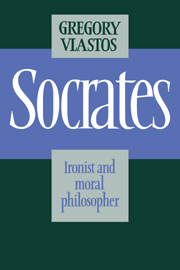Book contents
- Frontmatter
- Contents
- List of additional notes
- Introduction
- 1 Socratic irony
- 2 Socrates contra Socrates in Plato
- 3 The evidence of Aristotle and Xenophon
- 4 Elenchus and mathematics
- 5 Does Socrates cheat?
- 6 Socratic piety
- 7 Socrates' rejection of retaliation
- 8 Happiness and virtue in Socrates' moral theory
- Epilogue: Felix Socrates
- Additional notes
- Bibliography
- Index of passages cited
- Index of names in Plato and Xenophon
- Index of modern scholars
- Index of Greek words
3 - The evidence of Aristotle and Xenophon
Published online by Cambridge University Press: 21 October 2009
- Frontmatter
- Contents
- List of additional notes
- Introduction
- 1 Socratic irony
- 2 Socrates contra Socrates in Plato
- 3 The evidence of Aristotle and Xenophon
- 4 Elenchus and mathematics
- 5 Does Socrates cheat?
- 6 Socratic piety
- 7 Socrates' rejection of retaliation
- 8 Happiness and virtue in Socrates' moral theory
- Epilogue: Felix Socrates
- Additional notes
- Bibliography
- Index of passages cited
- Index of names in Plato and Xenophon
- Index of modern scholars
- Index of Greek words
Summary
At the start of the preceding chapter I staked out the claim that through a “Socrates” in Plato we can come to know the thought of the Socrates of history. By the end of the present chapter the reader should be in a fair position to judge if I am making that claim stick.
Let this much be agreed before I start: much as I need Plato's witness, I could not do the job if I had only his. The most we could learn from his writings is that in different periods of his life he puts into the mouth of Socrates philosophies which are not only different but, in important respects, antithetical. And that of itself would not give a particle of support to my claim. For there is no intrinsic reason why both of these philosophies, despite their polar differences, could not have been Plato's own original creations at different periods of his life. Within the present century we have seen a spectacular illustration of such a shift. In his Tractatus Wittgenstein produced a startlingly original philosophy and published it with the confidence that it would be his last word – indeed the last word – on the subject, announcing in the Preface: “The truth of the thoughts communicated in this work seems to me uncontestable and definitive.
- Type
- Chapter
- Information
- SocratesIronist and Moral Philosopher, pp. 81 - 106Publisher: Cambridge University PressPrint publication year: 1991



